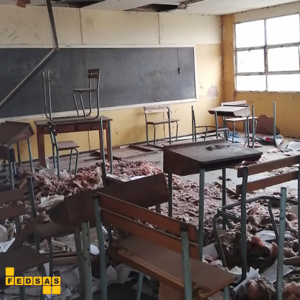20/10/2025 - Fedsas

How do education officials sleep at night knowing their negligence deprived hungry children of millions of meals at schools where they have to sit in crowded, dilapidated classrooms without resources that could help to ensure a better future?
“This is not about a lack of money. It is about provincial education departments failing to spend millions or rands!” says Dr Jaco Deacon, CEO of FEDSAS (the Federation of Governing Bodies of South African Schools).
News24 reported earlier this week that provincial education departments had to return about R150 million not spent during the 2024/25 financial year. It is also not the first time that this happened. In the past, the Director-General of the Department of Basic Education voiced his concern about this at the annual education lekgotla, but little has changed.
The biggest culprit is the Limpopo Education Department that failed to spend some R70 million in conditional grant funding, with more than R33 million earmarked for school nutrition programmes. At about R5 per child per day, the Limpopo Education Department deprived hungry learners of more than 6,5 million meals.
“There really is no way to justify this level of negligence. Limpopo is one of the poorest provinces in South Africa. More than 1,6 million learners in this province depend on school nutrition programmes for at least one healthy meal per day. At the start of the year, the Limpopo Education MEC, Ms Mavhungu Lerule-Ramakhanya boasted with the province’s matric results, stating that the province is on the rise. I wonder what learners in school nutrition programmes think of this. Or the regions were ECD centres could not be built despite money being available,” says Deacon.
Conditional grant funding may only be used for specified purposes. The unspent R150 million was earmarked for school nutrition programmes, infrastructure and the MST grant, aimed at increasing the number of learners in mathematics, science and technology.
Deacon says the Gauteng Education Department’s recent invalid decision to cut quintile 5 schools’ resources allocations with more than 60% could perhaps be interpreted at the hand of the fact that this provincial department had to return R53 million to the National Revenue Fund. Public schools receive their subsidies from this fund.
The Western Cape and the Northern Cape are the only provinces that spent all their conditional grant funding. Between April 2024 and March 2025, the Department of Basic Education transferred more than R26 billion rand for six conditional grants to the nine provincial education departments.
Some schools receive a conditional grant to increase the number of learners in mathematics, science and technology. “The careers of the future are based on these subjects. Schools that qualify for this grant use the money to buy equipment such as computers, microscopes and textbooks. Imagine the difference R28 million would have made if the education departments in the Free State, Limpopo, Mpumalanga and North-West had spent this money.”
FEDSAS has previously voiced its concern over the critical systemic decay in the public education system. “Most provincial education departments act as if they are a law unto themselves. Where is the Minister of Basic Education? Where are the parliamentary oversight committees? Last week, Parliament’s education portfolio committee visited the Free State. However, instead of taking the provincial education department to task, they showed up at schools to belittle school principals and criticise policy. Our children are robbed under the watch of provincial education departments.”
Deacon says provincial education departments have a huge responsibility towards the children of South Africa.
“It is time for incompetent officials and politicians to be held accountable in their personal capacity. The Minister has to step in now to prevent the entire system from collapsing.”